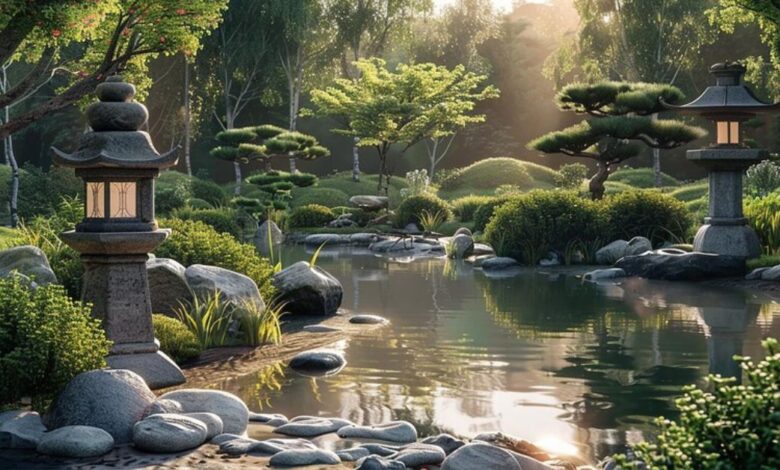Niwa Shizuka: Japanese Gardens and Serenity

Niwa Shizuka is a Japanese term encompassing the peace and beauty of traditional Japanese gardens, designed to evoke tranquility and reflection. Exploring Niwa Shizuka reveals not just the beauty of Japanese landscapes but a philosophy of calm that extends to mind and soul.
Understanding Niwa Shizuka and Its Meaning
“Niwa” translates to “garden” in Japanese, while “Shizuka” implies peace, stillness, and tranquility. Together, It means a garden that brings peace, designed to foster inner quiet through carefully arranged landscapes.
The Cultural Roots of Niwa Shizuka
Japanese garden design, or “teien,” is deeply rooted in history, drawing from influences like Shinto, Taoism, and Zen Buddhism. Niwa gardens were inspired by these traditions, designed to blend nature with spiritual reflection, offering visitors a retreat from the external world.
Elements of a Niwa Shizuka Garden
A Niwa Shizuka garden includes various elements: stone pathways, water features, natural rocks, and symbolic plant selections. Together, these elements mimic natural landscapes, aiming to create harmony between the garden and the viewer.
Design Principles in Niwa Shizuka
Niwa gardens follow distinct design principles, focusing on balance, asymmetry, and simplicity. Every element has a purpose, with natural colors, textures, and asymmetrical arrangements that gently guide the eye without overwhelming the senses.
Significance of Serenity in Japanese Gardens
The core of a Niwa garden is serenity. Visitors are encouraged to pause, take in the environment, and leave behind the rush of everyday life. This approach to calmness is fundamental to Japanese garden design, encouraging quiet and presence.
Connection to Zen Philosophy
Niwa is closely linked to Zen Buddhism, emphasizing mindfulness and the beauty of simplicity. By incorporating Zen principles, these gardens create spaces for meditation, where visitors can connect deeply with themselves and the world around them.
Plants and Landscapes in Niwa Shizuka
Plants are carefully selected in Niwa gardens to blend with natural seasons, reflecting a reverence for nature. Mosses, pines, maples, and bamboo are common choices, chosen for their subtle beauty and adaptability across seasons.
Water and Stone: Essential Elements of Calm
Water and stones are central to Niwa , symbolizing movement and stillness. Streams and ponds represent life’s flow, while rocks stand for resilience and stability, reminding viewers of life’s balance between change and constancy.
The Art of Minimalism in Niwa Shizuka
Minimalism plays a pivotal role Shizuka, avoiding excess and focusing on essential elements. This less-is-more philosophy enhances the feeling of peace, allowing visitors to focus on each element individually without distraction.
Modern Adaptations of it
Today, Niwa designs have evolved to fit modern spaces, from small urban homes to public parks. These contemporary adaptations maintain traditional elements while adding personal touches to suit current lifestyles and spaces.
Creating Your Own Niwa at Home
To bring Niwa Shizuka into your home, start with a small outdoor or indoor space. Choose a few stones, water features like a small fountain, and simple plants that thrive in your area, creating a peaceful oasis that embodies the spirit of Niwa .
Benefits of a Niwa Garden
Having a Niwa garden offers more than just aesthetic appeal; it provides mental health benefits, reducing stress, improving focus, and encouraging mindfulness. The simple act of spending time in a garden designed for calmness can have lasting positive effects.
Niwa Shizuka in Urban Settings
In urban areas, Niwa Shizuka gardens provide a refuge from city noise and stress. Public gardens, apartment balconies, and rooftop spaces can all incorporate elements of Niwa , bringing a slice of tranquility to even the busiest urban spaces.
Conclusion:
The timeless beauty and serenity of it lie in its dedication to peace, simplicity, and connection with nature. Whether enjoyed in traditional gardens or adapted to modern life, Niwa Shizuka remains a profound reminder of the value of stillness and balance in our lives.
FAQs
How does Niwa Shizuka differ from other garden styles?
Niwa-Shizuka emphasizes simplicity, balance, and Zen-inspired peace, often including elements like water, stone, and select plants to create a tranquil space.
Can I create a Niwa Shizuka garden indoors?
Yes! By incorporating miniature stones, a small fountain, and calming plants, you can create a Niwa Shizuka-inspired corner indoors.
What plants work best for a Niwa Shizuka garden?
Traditional choices include mosses, pines, bamboo, and Japanese maples, which are known for their adaptability and calming aesthetics.
Why is water important in Niwa Shizuka gardens?
Water symbolizes life’s flow and movement, adding a dynamic yet calming element to the garden, essential for balance in Niwa design.
How can Niwa Shizuka help improve mental well-being?
Spending time in a Niwa garden fosters mindfulness, reduces stress, and encourages peace, offering a mental break from everyday life.



